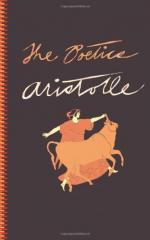|
This section contains 5,326 words (approx. 18 pages at 300 words per page) |

|
SOURCE: "The Conditions of Aesthetic Feeling in Aristotle's Poetics," in British Journal of Aesthetics, Vol. 24, No. 2, Spring, 1984, pp. 138-48.
In the following essay, Packer argues that the 'formal and psychological requirements of good tragedy "outlined by Aristotle in Poetics cannot be thought of as a definition of tragedy. Rather, Packer maintains, Aristotle intends them as "the premises and conclusion of a demonstration" that identifies the causal relationship between the formal features of tragedy and the psychological response of the audience or reader.
An important question raised by Aristotle's analysis of tragic art concerns the relative significance of, and relation between, two sets of requirements for good tragedy stipulated in Chapter VI of the Poetics. The first, which I shall call the 'formal requirement', lists several rules of composition and form the text itself must exhibit in order to have value as tragic poetry, such as its length and...
|
This section contains 5,326 words (approx. 18 pages at 300 words per page) |

|


